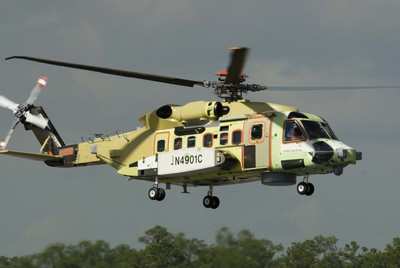Sat, Nov 27, 2010
Rheinmetall, Sikorsky Unveil The Cyclone In Bonn
The proposed Cyclone Naval Helicopter was recently presented by
Rheinmetall and Sikorsky at a joint news conference in Bonn. With a
view to the German Navy’s planned procurement of thirty
multi-role naval helicopters to replace its current Sea King
systems, the companies have joined forces with additional partners
in what they say is a pioneering alliance.

CH-148 Cyclone File Photo
With spare parts for the Sea King increasingly hard to come by
and levels of operational readiness for remaining aircraft no
longer adequate, the Germany Navy’s requirement for new
systems is deemed to be urgent. The Cyclone helicopter from
Sikorsky offered by the German Multi-Role Helicopter Team, in which
Rheinmetall plays a decisive role, is viewed as a promising
candidate for procurement.
Within the Sikorsky consortium, Rheinmetall is responsible for
future system logistics and in-service support (ISS), and will also
be responsible for the full range of instruction and flight crew
training operations.
The companies say that the Cyclone helicopter meets the German
Navy’s requirements. It is capable of simultaneously
performing multiple roles, including maritime surveillance,
anti-submarine warfare operations and engaging surface combatants.
It is also equipped for search and rescue missions.
Recently selected by the Canadian Navy, the aircraft is
currently undergoing trials under the designation CH148. The
companies say the Cyclone derives from the extensively used
civilian S-92 civilian helicopter, which is used in the oil and gas
industry for for servicing offshore platforms in the Gulf of
Mexico, the North Sea and the waters off Newfoundland, Brazil,
Australia, Malaysia and China and elsewhere.
The German Navy’s new helicopter is to be deployed
primarily in ship-based mode on its 124/125-class frigates and
702-class combat support ships. Among the new naval
helicopter’s tasks will be:
- Maritime surveillance and generating an operational picture at
sea.
- SAR with enough carrying capacity to evacuate ten rescued
crewmembers.
- Recon of suspicious vessels, including engagement of hostile
surface combatants with torpedoes and guided anti-ship
missiles.
- Anti-submarine warfare.
- Conducting boarding operations.
- Transporting tactical personnel and/or material.
More News
Light Gun A handheld directional light signaling device which emits a brilliant narrow beam of white, green, or red light as selected by the tower controller. The color and type of>[...]
“We have performed extensive ground testing by comparing warm up times, full power tethered pulls, and overall temperatures in 100 degree environments against other aircraft >[...]
While Taxiing To Parking The Right Landing Gear Leg Collapsed, Resulting In Substantial Damage Analysis: The pilot made a normal approach with full flaps and landed on the runway. >[...]
From 2014 (YouTube Edition): Exotic Rebuild Reveals Aerial Work Of Art During EAA AirVenture 2014, ANN's Michael Maya Charles took the time to get a history lesson about a great ai>[...]
Also: Project Talon, McFarlane Acquisition, Sky-Tec Service, JPL Earth Helo Tests Bombardier has earned a round of applause from the business aviation community, celebrating the fo>[...]
 ANN's Daily Aero-Term (12.13.25): Light Gun
ANN's Daily Aero-Term (12.13.25): Light Gun Aero-News: Quote of the Day (12.13.25)
Aero-News: Quote of the Day (12.13.25) NTSB Final Report: Gippsland GA-8
NTSB Final Report: Gippsland GA-8 Classic Aero-TV: Historically Unique -- Marlin Horst's Exquisite Fairchild 71
Classic Aero-TV: Historically Unique -- Marlin Horst's Exquisite Fairchild 71 Airborne 12.12.25: Global 8000, Korea Pilot Honors, AV-30 Update
Airborne 12.12.25: Global 8000, Korea Pilot Honors, AV-30 Update



